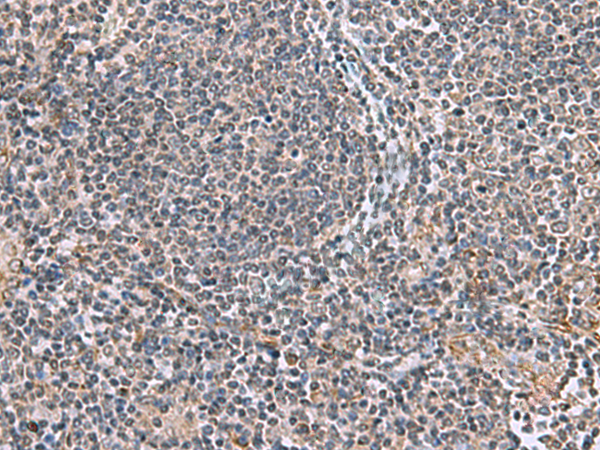
| WB | 咨询技术 | Human,Mouse,Rat |
| IF | 咨询技术 | Human,Mouse,Rat |
| IHC | 1/25-1/100 | Human,Mouse,Rat |
| ICC | 技术咨询 | Human,Mouse,Rat |
| FCM | 咨询技术 | Human,Mouse,Rat |
| Elisa | 1/5000-1/10000 | Human,Mouse,Rat |
| Aliases | FRP-2; SARP1; SDF-5 |
| Host/Isotype | Rabbit IgG |
| Antibody Type | Primary antibody |
| Storage | Store at 4°C short term. Aliquot and store at -20°C long term. Avoid freeze/thaw cycles. |
| Species Reactivity | Human, Mouse |
| Immunogen | Synthetic peptide of human SFRP2 |
| Formulation | Purified antibody in PBS with 0.05% sodium azide and 50% glycerol. |
+ +
以下是3篇与SFRP2抗体相关的文献及其简要摘要:
---
1. **文献名称**: "Secreted frizzled-related protein 2 is a prognostic biomarker and predicts response to anti-angiogenic treatment in metastatic colorectal cancer"
**作者**: Mundle, S. D., et al.
**摘要**: 该研究通过免疫组化技术分析SFRP2在结直肠癌组织中的表达,发现高表达SFRP2与患者预后不良相关,并提示SFRP2抗体可能作为预测抗血管生成治疗反应的生物标志物。
---
2. **文献名称**: "SFRP2 suppresses fibrosis and inhibits Wnt signaling in myocardial infarction"
**作者**: Saito, Y., et al.
**摘要**: 研究利用SFRP2特异性抗体在小鼠心肌梗死模型中检测蛋白表达,发现SFRP2通过抑制Wnt/β-catenin通路减轻心肌纤维化,提示其作为治疗心脏纤维化的潜在靶点。
---
3. **文献名称**: "SFRP2 modulates vascular smooth muscle cell phenotypic switch in atherosclerosis"
**作者**: Matsushima, K., & Aoyama, T.
**摘要**: 该研究通过Western blot和免疫荧光技术,证明SFRP2抗体检测到其在动脉粥样硬化斑块中高表达,并调控血管平滑肌细胞向促炎表型转化,揭示其在动脉硬化病理机制中的作用。
---
以上研究均通过SFRP2抗体进行蛋白表达分析,涵盖癌症、纤维化及心血管疾病领域,反映了SFRP2的多功能调控角色。
The secreted frizzled-related protein 2 (SFRP2) antibody is a tool used to study the biological role of SFRP2. a glycoprotein belonging to the SFRP family that modulates Wnt signaling pathways. SFRP2 acts as a Wnt antagonist by binding to Wnt ligands or frizzled receptors, thereby regulating cell proliferation, differentiation, and tissue homeostasis. It plays critical roles in embryonic development, bone formation, angiogenesis, and tissue repair. Dysregulation of SFRP2 has been implicated in various diseases, including cancer, fibrosis, and cardiovascular disorders. In cancer, SFRP2 exhibits dual roles—acting as a tumor suppressor in some contexts (e.g., inhibiting Wnt/β-catenin signaling) or promoting tumor progression in others (e.g., enhancing matrix metalloproteinase activity or angiogenesis).
SFRP2 antibodies are widely utilized in research to detect protein expression levels, localization, and interactions via techniques like Western blotting, immunohistochemistry, and immunofluorescence. They help elucidate SFRP2's involvement in disease mechanisms and its potential as a therapeutic target. For instance, neutralizing SFRP2 with antibodies has shown promise in preclinical models for inhibiting tumor growth or fibrosis. However, challenges remain, including understanding context-dependent functions and optimizing antibody specificity to avoid off-target effects. Ongoing studies aim to refine SFRP2-targeted therapies and diagnostic applications, leveraging its dual regulatory nature in Wnt signaling pathways.
×